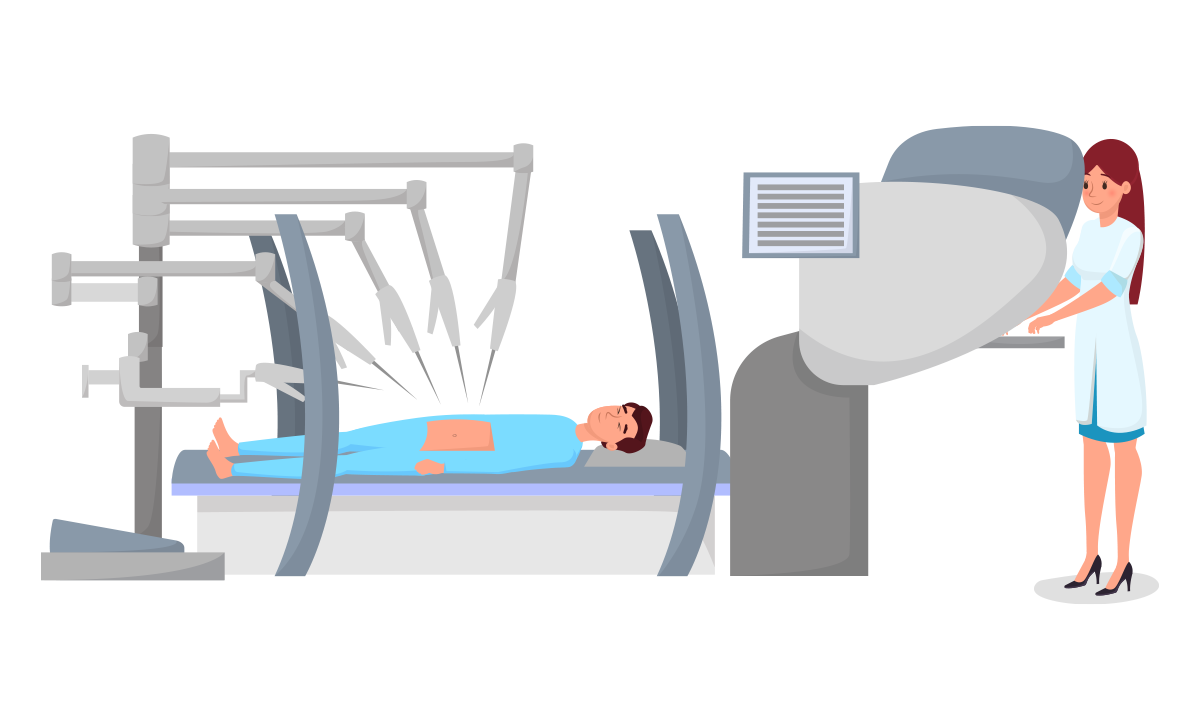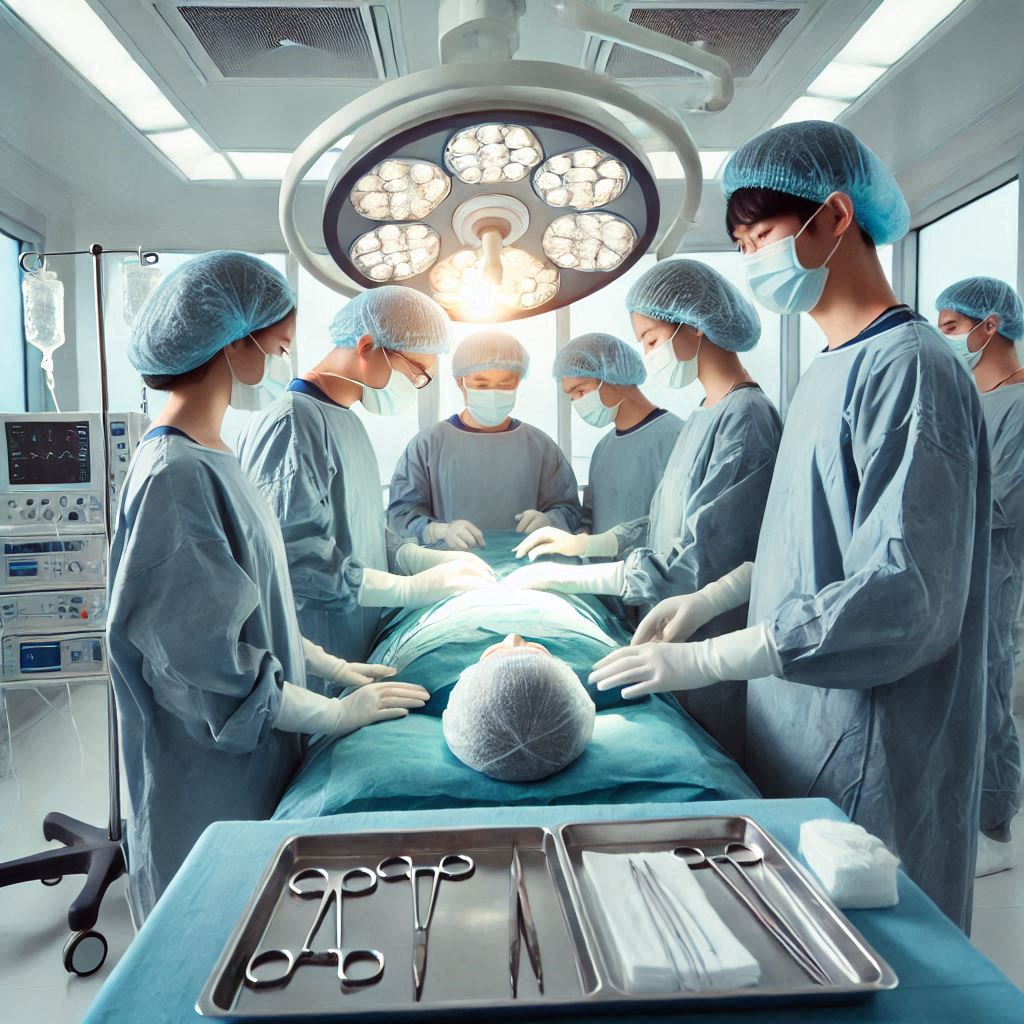This Course Structure is Curated as per the NEP-2020 Guidelines
Course Overview
The B.Sc. Surgical Robotic Technology program at Malla Reddy Vishwavidyapeeth, Hyderabad, is an undergraduate course designed to equip students with specialized knowledge and practical expertise in robotic-assisted surgeries. This program focuses on training students to assist surgeons during minimally invasive procedures using advanced robotic systems, emphasizing precision, patient safety, and operational efficiency.
This program focuses on equipping students with the theoretical knowledge and hands-on skills from 1st semester itself. The curriculum covers a foundational understanding of surgical robotics, biomechanics, and instrumentation, progressing to advanced training in operating robotic systems, managing surgical workflows, and ensuring the seamless execution of robotic-assisted surgeries. Students also gain expertise in troubleshooting robotic systems, sterilization protocols, and patient care during robotic-assisted procedures, ensuring they are prepared to handle real-world surgical scenarios.
Graduates of this program emerge as ‘Skilled Surgical Robotic Technologists’, enabling them to pursue further higher studies & do research in Surgical Robotic Technology along with plenty of job opportunities globally.

Course Details
Description: 4 Years Degree Program
No. of Credits: 160 minimum and as specified
- Eligibility
- Curriculum Structure
- Program Outcomes
- Career Enhancement
- Higher Studies
- Job Roles & Progression
Educational Qualification: 10+2 or equivalent with at least 50% aggregate marks in Physics, Chemistry, and Biology/Mathematics from a recognized board (CBSE/ISC or equivalent).
| Semester | Name of the Subject |
| Semester 1 | Human Anatomy Medical Physics Basics of Robotics Fundamentals of Surgery Practical: Anatomy & Physiology English & Communication Skills Computer Applications |
| Semester 2 | Human Physiology Medical Electronics Introduction to Robotic Systems Surgical Instrumentation Practical: Robotics Lab |
| Semester 3 | Biomechanics Robotic Programming Minimally Invasive Surgery Techniques Safety in Robotic Systems |
| Semester 4 | Advanced Imaging Techniques Electromechanical Systems Clinical Applications of Robotics Project-Based Learning |
| Semester 5 | Robotic-Assisted Procedures Surgical Equipment Management Infection Control Practical: Advanced Robotics Techniques |
| Semester 6 | Troubleshooting Robotic Systems Hospital-Based Training Ethical Practices in Surgical Robotics Internship |
| Semester 7 & 8 | Internship On-Job Training in Surgical Robotics Capstone Project |
- Fundamentals of Surgical Robotics: Comprehensive understanding of robotic systems used in minimally invasive surgeries, including their components, design, and functionalities.
- Robotic-Assisted Surgery Techniques: Proficiency in assisting robotic surgeries by setting up systems, calibrating instruments, and supporting surgeons during procedures.
- Human-Robot Interaction: Knowledge of safety protocols and ergonomics to ensure effective collaboration between humans and surgical robots.
- Medical Imaging and Navigation: Skills in integrating imaging techniques (e.g., CT, MRI) with robotic systems for precise surgical navigation and planning.
- Robotics Maintenance and Troubleshooting: Expertise in maintaining and troubleshooting surgical robotic systems to ensure optimal performance and safety.
- Ethics and Regulatory Compliance: Awareness of ethical considerations, patient safety standards, and regulatory requirements for robotic-assisted surgeries.
- Future Technologies in Surgery: Insights into advancements such as AI integration, telesurgery, and augmented reality in robotic surgery.
- Advanced Certifications: Specialized training on robotic systems like the da Vinci Surgical System.
- Workshops: Participation in skill enhancement workshops on surgical robotics.
- Hospital Internships: Hands-on training under expert surgical teams in leading hospitals.
- Research Opportunities: Exposure to ongoing developments in robotic surgery technology.
- M.Sc. in Surgical Robotics: Advanced studies in the design, development, and application of robotic systems in healthcare.
- Postgraduate Diploma in Robotic Surgery Assistance: Specialized training in surgical support roles.
- M.Sc. in Biomedical Engineering with Robotics Focus: Interdisciplinary study combining robotics, biomedical engineering, and healthcare innovation.
- M.B.A. in Healthcare Technology Management: Leadership training for managing robotic technology in healthcare settings.
| Duration | Roles and Responsibilities | Salary Range |
| 0-3 years | Robotic Surgery Technician, Junior Surgical Assistant | ₹3,50,000 – ₹5,00,000 per annum |
| 3-5 years | Senior Robotic Surgery Technologist, Clinical Application Specialist | ₹5,50,000 – ₹8,00,000 per annum |
| 5-10 years | Lead Robotic Technologist, Robotic System Trainer | ₹8,00,000 – ₹12,00,000 per annum |
| 10+ years | Director of Robotic Surgery Services, Research Lead | ₹12,00,000+ per annum |
Note: Salaries vary based on experience, location, and type of healthcare institution.

Fee Structure Per Academic Year - 2025
| Tuition Fee | Miscellaneous Fee | Scholarship | |||
| 125000 ₹ | 10000 ₹ | Above 95% – 125000 ₹ | Above 91% – 62500 ₹ | Between 81-90% – 12500 ₹ | Between 71-80% – 6250 ₹ |
| Tuition Fee | Miscellaneous Fee | Scholarship | ||
| 125000 ₹ | 10000 ₹ | Above 90% – 25000 ₹ | Between 80-90% – 12500 ₹ | Between 70-80% – 8000 ₹ |




